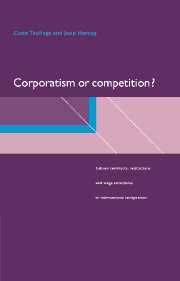 Corporatism or Competition?
Corporatism or Competition? Book contents
- Frontmatter
- Contents
- Preface
- Symbols and abbreviated references
- Synopsis
- 1 What we observe and what we claim
- 2 The role of corporatism in models of surplus sharing
- 3 Beliefs, norms and institutions
- 4 Union behaviour
- 5 Wage differentials and rent sharing
- 6 Tenure wage profiles
- 7 Unemployment and wage flexibility
- 8 Inside corporatism: how the Dutch play their game
- 9 An assessment: competition or corporatism?
- References
- Index
3 - Beliefs, norms and institutions
Published online by Cambridge University Press: 23 November 2009
- Frontmatter
- Contents
- Preface
- Symbols and abbreviated references
- Synopsis
- 1 What we observe and what we claim
- 2 The role of corporatism in models of surplus sharing
- 3 Beliefs, norms and institutions
- 4 Union behaviour
- 5 Wage differentials and rent sharing
- 6 Tenure wage profiles
- 7 Unemployment and wage flexibility
- 8 Inside corporatism: how the Dutch play their game
- 9 An assessment: competition or corporatism?
- References
- Index
Summary
Beliefs, norms and institutions: a tight web of interdependence
As we have seen, the labour market institutions in countries with comparable levels of income per head differ markedly. The Northern American economies have highly decentralized institutions for wage formation, while wage setting in Scandinavian countries is done for a large part at a more centralized level. Other countries have institutions which at first glance look like a mixture of both archetypes. At present, it is fair to say that there is no consensus among economists about which type of institutions is most efficient, so that we do not know which group of countries could improve its standard of living by adopting the institutions of the other. But suppose that smart economists had a wellfounded opinion on this issue. Would that enable us to move countries from the one set of institutions to the other? If the competitive market is indeed so efficient, then the decentralized non-corporatist system of the United States would be a model for other countries to copy. Why then would Europe have maintained its inefficient institutions for such a long time? Or, starting at the other end and borrowing the words of Richard Freeman, if corporatism is so good, why does not everybody jump on the bandwagon?
The simple economists' interpretation of the idea of an institution suggests that transfers are easy. Institutions are the organizations, and the formal rules, imposed by the government to constrain economic behaviour.
- Type
- Chapter
- Information
- Corporatism or Competition?Labour Contracts, Institutions and Wage Structures in International Comparison, pp. 106 - 129Publisher: Cambridge University PressPrint publication year: 1998


